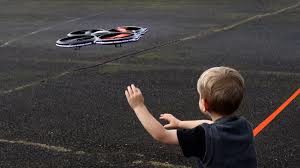‘Drones that pay hide-and-seek, virtual reality video games and satellite tracked treasure hunts.’
 A new report The Future Of Play from ‘future trends experts’ Futurizon says that advances in technology over the next decade will encourage kids to be more, not less active.
A new report The Future Of Play from ‘future trends experts’ Futurizon says that advances in technology over the next decade will encourage kids to be more, not less active.
The author of the report, Dr Ian Pearson predicts that new gadgets such as activity-tracking jewellery and drones that can play ‘hide and seek’ or shoot jets of water, will help to maximise activity levels. Moreover, the most exciting change predicted for the next decade will be the arrival of augmented reality (AR).
According to the report, which was commissioned by Soreen and the Youth Sport Trust, over the coming years AR glasses, which superimpose computer-generated data onto the real world view, will become as normal as owning a smart phone. It will mean that, while previous generations of technology obliged people to stare at a screen, AR glasses will encourage users to get out and explore the world.
It foresees that these glasses will revolutionise everything from family outings to school trips as it blends the virtual and real worlds and encourages people to go out and be active, with computers enhancing the real world. It will also encourage kids to use their imagination and conjure up scenarios to inspire active play.
Over three quarters of the respondents (78%) in the report said that children are now so tech savvy, that digital devices should be used to help them exercise,
“We know from our own Class of 2035 report and working closely with schools that integrating digital technology into PE lessons and other subjects, can increase participation and enjoyment and empowers young people to take responsibility for their own activity levels,” said Alison Oliver, Chief Executive at the Youth Sport Trust.
Other future technological advancements predicted for the next ten years will also contribute to making Britain healthier, the report predicts.
For example, school vending machines might use fingerprint recognition to bring up a child’s records, or read the student’s fitness tracker to identify their daily calorie consumption up to that point, before offering them the most appropriate snacks.
New generation, super-accurate satellite locating will also increase the popularity of Geocaching in the future, a modern-day treasure hunt where people find hidden boxes using their phone location.
Image recognition on smart phones will make family day trips, visits to the park or even the walk to school more stimulating by allowing children to point the camera at landmarks, cars, plants or animals and quickly discover all about them. Learning sports will also be revolutionised in the next decade, the report claims.





